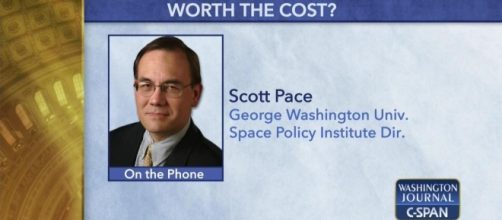Space Policy Online is reporting that the White House has announced the intention to appoint Scott Pace as executive director of the National Space Council. The space council was re-established recently by executive order by President Donald Trump. It will comprise a number of cabinet and agency heads, including the administer of NASA, and will be chaired by Vice President Mike Pence.
Who is Scott Pace?
Currently, Pace is Director of the Space Policy Institute and Professor of Practice of International Affairs at George Washington University (GWU).
During the George W. Bush administration, he was Associate Administrator for Program Analysis and Evaluation at NASA. He is closely allied with former NASA Administrator Mike Griffin under whom he served. Pace’s experience includes developing the Constellation program that was designed to return Americans to the moon and send them to Mars. Constellation was canceled by President Barack Obama. He also served in positions at the Commerce Department and the United Nations delegation.
What is the significance of Pace’s appointment?
Pace’s appointment means that the creation of an infrastructure for the formulation of space policy at the White House is proceeding apace. Some reports suggest that the administration is in no hurry to formulate a Trump space policy, perhaps taking as long as two years.
By contrast, Obama took 18 months and George W. Bush five and a half years. On the other hand, President John F. Kennedy took just less than four months to develop the Apollo program to send men to the moon by the end of the 1960s.
Pace is well respected by institutional players in aerospace. Besides being an ally of Griffin, his appointment was praised by John Logsdon, the founder of the Space Policy Institute, and Mary Lynn Dittmar, President and CEO of the Coalition for Deep Space Exploration (CDSE). However, Pace’s appointment may cause some heartburn among some commercial space advocates because of his institutional background and his association with the Constellation program.
Pace’s task is going to be enormous.
A large number of decisions, great and small, will need to be made before the official Trump space policy is rolled out. With the admission by NASA that it lacks the funding to adequately execute the Journey to Mars, the Space Council will have to develop a strategy for deep space exploration going forward. How will Americans go back to the moon and on to Mars? What exactly will be the involvement of the commercial sector in space exploration activities?
Of course, the Trump administration still needs to nominate a NASA administrator and deputy administrator. An announcement is thought to happen “soon.”


